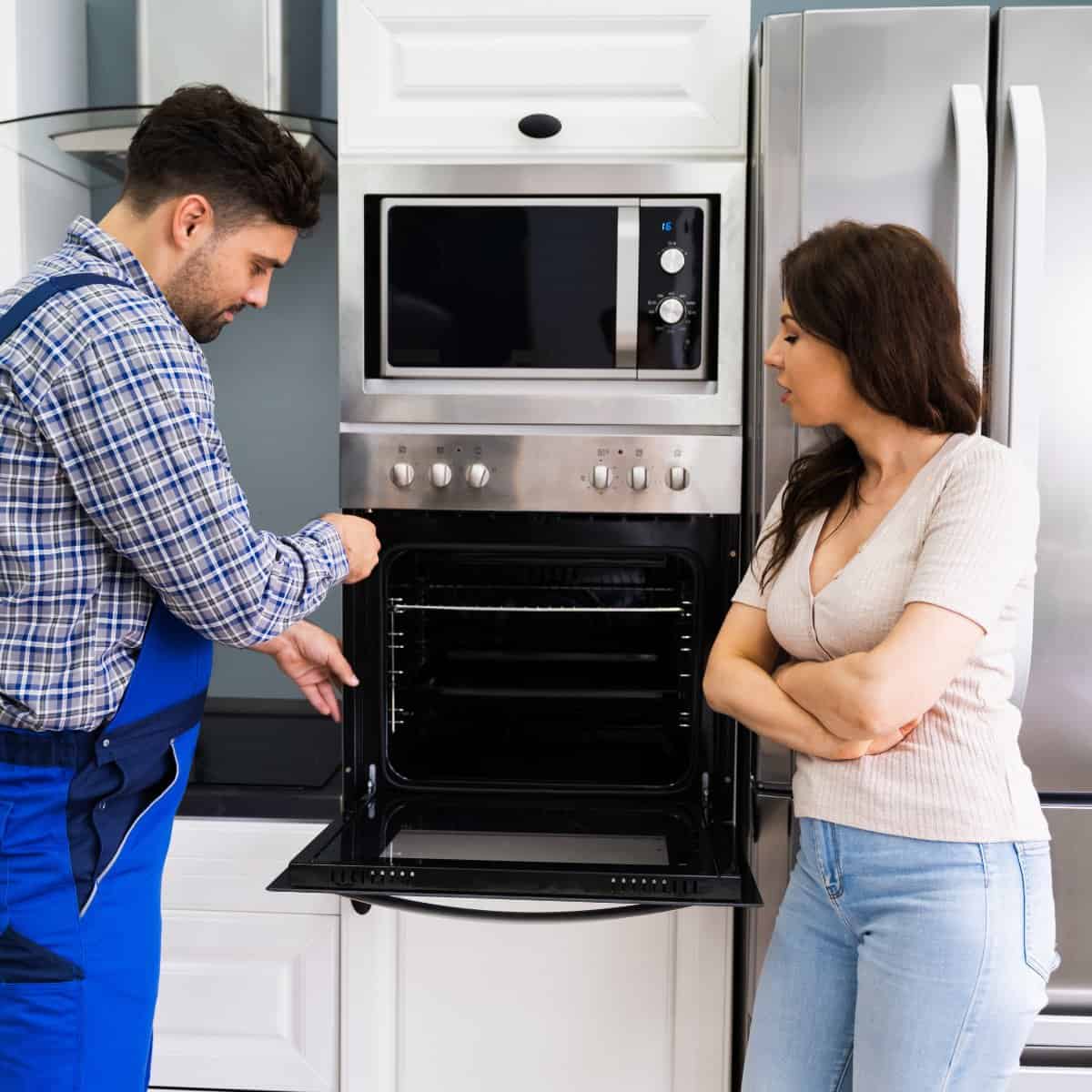Why Wattage Matters for Stovetops and Microwaves: A Comprehensive Guide
Wattage is a SI unit of power, and it indicates how much power an appliance has.
The wattage of an electric cooking appliance is important for several reasons.
- First, it determines how much power the appliance uses. The higher the wattage, the more power the appliance uses.
- Second, the wattage determines how quickly the appliance heats up. The higher the wattage, the faster the appliance will heat up.
- Finally, the wattage determines how hot the appliance gets. The higher the wattage, the hotter the appliance will get.
When choosing an electric cooking appliance, it is important to consider all of these factors. The wattage is just one factor to consider, but it is an important one.
Choose an appliance with a wattage that meets your needs and you will surely have a great cooking experience.
The only downside to having a higher wattage count, next to the price of the appliance oftentimes being higher, is that it’s more expensive to run for the same amount of time.
In this article, I’ll explain why wattage is important when choosing a cooking appliance and how it affects the energy consumption and cooking speed.


Check out our new cookbook
Bitemybun's family recipes with complete meal planner and recipe guide.
Try it out for free with Kindle Unlimited:
Read for freeIn this post we'll cover:
What Do Watts Really Mean When It Comes To Cooking Appliances?
Watts are a unit of measurement for electrical power. It measures the rate at which energy is transferred or consumed. In simpler terms, watts measure how much power is being used by an electrical device.
Why Is It Important To Know The Wattage Of Your Cooking Appliance?
Knowing the wattage of your cooking appliance is important because it determines how much energy is being used to produce heat. The higher the wattage, the more power the appliance is using, and the greater the heat produced.
- A small light bulb typically uses around 40 watts, while a larger appliance like an oven can use up to 5,000 watts.
- The wattage of a microwave is particularly important because it determines how quickly food will cook. A microwave with a higher wattage will cook food faster than one with a lower wattage.
- If you want to cook a piece of food quickly, you’ll need an appliance with a higher wattage. If you’re not in a rush, a lower wattage appliance will do just fine.
How Is Wattage Measured?
Wattage is measured in watts, which is a unit of power. It’s a measure of how much energy is being used or produced per unit of time.
- For example, if an appliance uses 1,000 watts and is run for one minute, it will have used 1,000 watts of energy during that period.
- If an appliance uses 2,000 watts and is run for one minute, it will have used twice as much energy as the 1,000-watt appliance.
How Do Solar Panels And RV Equipment Use Watts?
Solar panels and RV equipment also use watts to measure the amount of power they produce or consume.
- Solar panels produce electricity by converting sunlight into electrical energy. The amount of power produced is measured in watts, and the larger the solar panel, the more watts it can produce.
- RV equipment, such as refrigerators and air conditioners, also use watts to measure the amount of power they consume. RV owners need to know the wattage of their equipment to ensure they have enough power to run everything they need while on the road.
Why Wattage Matters for Stovetops
Wattage is the amount of power an electric appliance is able to use. It is measured in watts (W) and is the rate at which electrical energy flows through a medium. The size of an appliance doesn’t matter when it comes to wattage, as both small and large appliances can have high or low wattage ratings.
Why is wattage important for stovetops?
- The wattage of a stovetop burner determines how much heat it is able to produce.
- The higher the wattage, the more powerful the burner and the faster it can heat up.
- If you want to cook food quickly, you’ll need a stovetop with high wattage burners.
- The wattage rating also indicates how much energy the burner needs to sustain its heat.
- If the wattage is too low, the burner may not be able to sustain the heat needed to cook your food properly.
How do you calculate the wattage of a stovetop?
- The wattage of a stovetop burner is usually found in the product manual or on a label on the unit itself.
- If you’re considering installing a new stovetop, you can compare the wattage ratings of different stoves to determine which one will meet your cooking needs.
- To calculate the total wattage of a stovetop, simply add up the wattage of each burner.
What are some helpful tips to know about wattage and stovetops?
- A single burner on a stovetop can have a wattage rating ranging from 500 to 3000 watts.
- The larger the burner, the higher the wattage rating will probably be.
- When cooking meat, you’ll want to use a burner with high wattage to sear the meat and lock in the juices.
- If you’re using a stovetop with a lower wattage rating, you may need to add more time to your cooking process.
- If you’re traveling in an RV or on a boat, you may need to consider the wattage of your stovetop in relation to the daily wattage output of your solar panels or generator.
- The wattage rating of a stovetop burner indicates the amount of energy consumed by the burner.
- Measuring the wattage of a light bulb is also helpful in determining the total wattage needed for an appliance or system.
How does wattage compare to stovetop ratings?
- The rating of a stovetop burner is based on the size of the burner and the heat transfer it is able to produce.
- Smaller burners will have lower ratings, while larger burners will have higher ratings.
- The rating of a stovetop burner indicates the maximum temperature it is able to reach, while the wattage rating indicates the amount of power it consumes.
- The two ratings are different, but both are useful in determining which stovetop will best suit your cooking needs.
How is wattage useful for boiling water on a stovetop?
- Boiling water on a stovetop requires a burner with high wattage.
- The higher the wattage, the faster the water will boil.
- If you’re in a hurry, a stovetop with high wattage burners will be helpful in getting your water to boil quickly.
Why Wattage Matters for Microwaves
Microwaves are a great convenience in the kitchen, allowing people to quickly prepare dishes without having to spend a lot of time cooking. The wattage of a microwave is an important factor to consider when looking for the perfect model to suit your needs. Higher wattage microwaves are more powerful and cook food faster than lower wattage models. If you’re looking for a microwave that can cook your food quickly and efficiently, then a higher wattage model is the way to go.
Size Matters
The size of your microwave also plays a role in the wattage you need. Larger microwaves require more power to cook food evenly, so you’ll want to consider a higher wattage model if you have a larger microwave. On the other hand, smaller microwaves typically require less wattage to cook food, so you can get away with a lower wattage model if you have a smaller microwave.
Types of Microwaves
There are a wide variety of microwaves available on the market today, each with their own features and benefits. Here are some of the different types of microwaves you can choose from:
- Standard microwaves: These microwaves are the most affordable and widely sold type of microwave. They typically have wattages starting at around 600 and going up to 1200 watts.
- Smart microwaves: These microwaves offer updated features like Wi-Fi connectivity and voice control. They can range in wattage from 700 to 1200 watts.
- Convection microwaves: These microwaves have an additional heating element and fan that allows them to cook food more evenly. They typically range in wattage from 900 to 1500 watts.
Benefits of Higher Wattage
While higher wattage microwaves may be more expensive, they offer a number of benefits that make them worth the extra cost. Here are some of the benefits of choosing a higher wattage microwave:
- Faster cooking times: Higher wattage microwaves can cook food faster, which is great for people who are short on time.
- More even cooking: Higher wattage microwaves can cook food more evenly, which means you won’t have to worry about hot spots or cold spots in your food.
- Ideal for larger dishes: If you frequently cook large dishes in your microwave, then a higher wattage model is ideal. It will be able to cook your food more evenly and quickly than a lower wattage model.
Safety Considerations
It’s important to keep safety in mind when choosing a microwave wattage. Here are some helpful tips to keep in mind:
- Check the wattage: Make sure to check the wattage of any microwave you’re considering before you buy it. This will help you pick the right model for your needs.
- Follow the instructions: Always follow the instructions that come with your microwave to ensure that you’re using it safely and correctly.
- Don’t overheat water: Microwaving water can be dangerous if it’s heated for too long. Make sure to follow the instructions carefully and never overheat water in your microwave.
The Bottom Line
When it comes to choosing the right wattage for your microwave, it all depends on your needs and preferences. If you want a microwave that can cook your food quickly and efficiently, then a higher wattage model is the way to go. However, if you’re looking for a more affordable option, then a lower wattage model may be perfect for your needs. Just make sure to check the wattage and follow the safety instructions to get the best result.
Conclusion
So, wattage is important when it comes to cooking appliances because it determines the amount of energy they produce.
Plus, you need to know the wattage of your stovetop so you can properly calculate the wattage of your microwave when you’re looking for a new one. So, don’t forget to look at the wattage when buying a new cooking appliance.
Check out our new cookbook
Bitemybun's family recipes with complete meal planner and recipe guide.
Try it out for free with Kindle Unlimited:
Read for freeJoost Nusselder, the founder of Bite My Bun is a content marketer, dad and loves trying out new food with Japanese food at the heart of his passion, and together with his team he's been creating in-depth blog articles since 2016 to help loyal readers with recipes and cooking tips.
